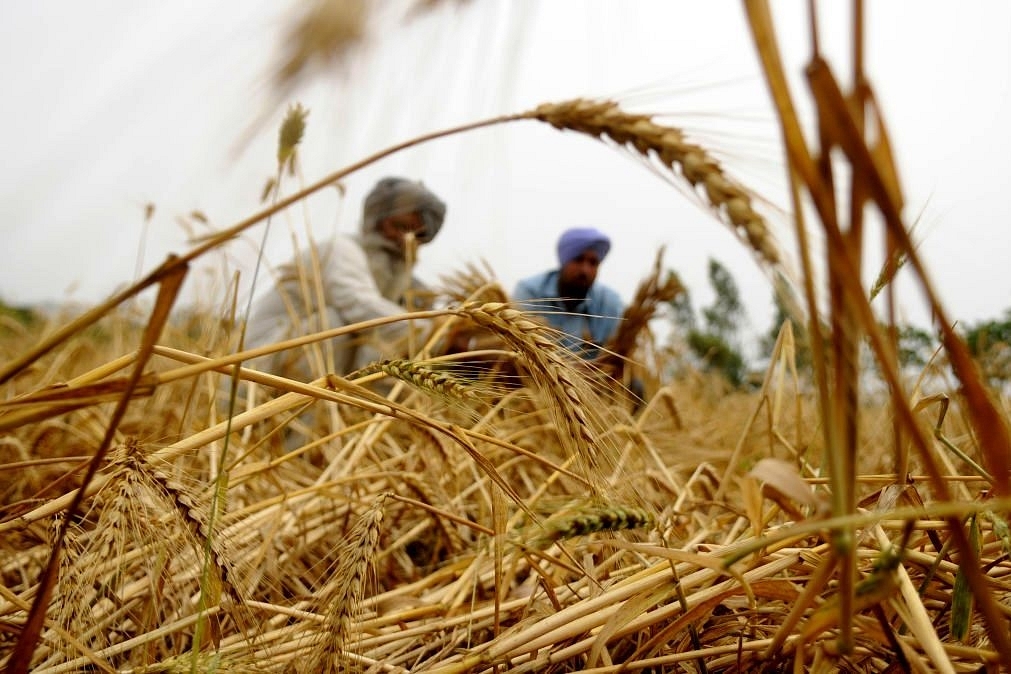Economy
Finally, Indian Farmer Gets A Whiff Of National Market; ECA, APMC Laws In For Overhaul
- The reforms will free farmers from the shackles of government-induced dependence on handouts and crumbs.

Wheat farmers in Punjab. (Bharat Bhushan/Hindustan Times via Getty Images)
Even as India’s opposition and Left-wing intellectuals go apoplectic over Narendra Modi’s 'Rs 20 lakh crore package' that will not put huge amounts of cash in the pockets of the poor, the government has just announced critical reforms that will enable farmers to help themselves to more money without having to play beggars to the exchequer.
On Day Three of the piecemeal announcement of the package, Finance Minister Nirmala Sitharaman unleashed what could potentially be more important to the farm economy than all the bailout and relief packages announced earlier.
She announced three market reforms on Friday (15 May) that will free farmers — India’s original and hardiest entrepreneurs — from the shackles of government-induced dependence on handouts and crumbs.
These reforms are:
#1: Amendment of the Essential Commodities Act (ECA), a relic of the 1950s decade of Socialist shortages, so that the market for most foodstuff is deregulated. This means farmers and traders will be free to enter into export commitments without the fear that the government may turn the tap on or off based on domestic prices or production.
Stock limits will not apply to food processors or value chain players, thus ending the bogey that any price increase is the result of 'hoarding' by anti-social elements. What these changes will do is reduce government meddling in the major farm markets, except in exceptional circumstances.
It will free farmers from having to sell at distress prices even when domestic prices are high as middlemen will skim the cream; it will also make India a reliable supplier in the agri-produce export markets.
#2: Ending the barriers to inter-state agricultural trade with a central law for the same. This will enable farmers to sell their produce in any favourable agricultural market and not just at the local state mandi. Currently, Agriculture Produce Marketing Committee (APMC) laws force farmers to sell only to government-licensed agents at these mandis, thus denying them fair prices.
Reason: a farmer may rush to the mandi based on a certain price expectation, but when lots of farmers arrive at the same mandi with their produce, the excess arrivals end up strengthening the buying power of the agents and prices crash. The farmer can, of course, take his produce back home, but this means incurring additional transport and storage costs.
Now, once e-trading is allowed and deliveries can be made outside one’s own state, farmers can sell at an acceptable price and deliver wherever it is advantageous to them.
This move will prod many states to start amending their anti-farmer APMC legislations, and Karnataka has already announced that it will do so. The APMC is a relic of a different era, and can easily be disbanded.
#3: The government is also planning to create a legal framework where farmers can work out supply deals with retailers, food aggregators, exporters, and other processors so that contract farming gives both producers and buyers an acceptable price.
This will cut out the middleman, and allow buyers and sellers to divide that middleman’s margin between themselves, thus benefiting both producers of food and consumers. Both gain from this disintermediation.
When these reforms are carried out effectively, the Indian farmer will need fewer crutches, fewer bailouts by the taxpayer. State governments, which never cease to shed crocodile tears over the plight of the poor farmer, should do their bit so that the farmer will have learned to walk with his head held high.
Support Swarajya's 50 Ground Reports Project & Sponsor A Story
Every general election Swarajya does a 50 ground reports project.
Aimed only at serious readers and those who appreciate the nuances of political undercurrents, the project provides a sense of India's electoral landscape. As you know, these reports are produced after considerable investment of travel, time and effort on the ground.
This time too we've kicked off the project in style and have covered over 30 constituencies already. If you're someone who appreciates such work and have enjoyed our coverage please consider sponsoring a ground report for just Rs 2999 to Rs 19,999 - it goes a long way in helping us produce more quality reportage.
You can also back this project by becoming a subscriber for as little as Rs 999 - so do click on this links and choose a plan that suits you and back us.
Click below to contribute.
Latest